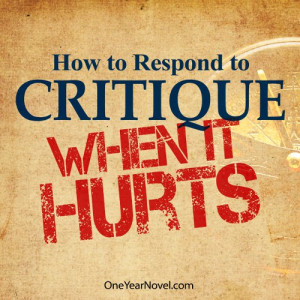How to Respond to Critique When it Hurts
Guest Post
We asked Rachel Garner, known as Nairam within The One Year Adventure Novel (OYAN) community, to share her insight and original metaphor about responding to feedback on a novel.
 Gold Bricks, Stubbed Toes and Cloaked Strangers
Gold Bricks, Stubbed Toes and Cloaked Strangers
Writers, when you get a critique document or someone tells you, “Hey, I read your novel—” I can be almost certain of some of your reactions: your heartbeat quickens, your stomach knots, and you think why-oh-why did I ever want to be a writer?
Critiques hurt. I mean, real critiques. The ones that will help you make your book better. Not the pat-on-the-back feedback—that’s easy to get, especially in non-writer circles—but the brutally honest “Ouch!” critiques that, after depressing you for a week, push you on to greater things.
Think about it this way. I’m walking along, expecting nothing. A person walks up to me with a brightly-wrapped gift box and hands it to me. Bewildered, I take it and start to thank them but only get as far as “thank—” before I realize the extreme weight of the box they’ve just handed me, and I drop it on my toe. Ouch! I forget about thanking them, cry instead, and then rip the wrapping paper off revengefully.
It’s not a box. It’s a gold brick.
This is a critique.
The size of the brick and the method of delivery will vary from person to person—family members and friends may bring you ice packs and apologize profusely. On the opposite extreme, sometimes you may have dark strangers shove bricks wrapped in dirty newspaper at you and then take off at a run. You’ll get bricks the size of LEGOs and bricks that not only fall on your toe, but break it.
Maybe that’s a dorky metaphor, but I think it matches.
Let me say again: real critiques hurt. They will always hurt. I have been writing fairly seriously for six years. Last year, I placed third in OYAN’s student contest, but along with my shiny trophy came judges’ comments that included the gem “I don’t really care about your main character” and the suggestion that my book was way too short—something that could only be remedied by extensive rewriting.
Yowch.
Are some people unnecessarily mean? Perhaps. But sometimes they’re just honest about what they think. These are the dirty-newspaper-dark-cloak people. Forget the broken toe. Chase after them with all you’ve got. I’m pretty sure there’s gold peeping out from that newspaper.
If you want to be a writer, that gold should be more important than your toes.
So how do we woo these dirty-newspaper people? What is the best way to respond to something that hurts but gives us so much?
I have not only written a lot in the last six years, I’ve critiqued a lot. And just as critiquers can be mist-wrapped dark strangers who hurl bricks at your foot and then run away, writers can be the most ungrateful creatures. As we’ve (hopefully) established by now, critiques hurt. So, sometimes, writers lash out. First bit of advice: Don’t.
Let’s pretend you’ve just had a “really mean” critique. Before you respond, here are some things to consider.
1. Usually the “meaner” the critique, the more time it took to compose it. (This is excluding the people who simply say “ur bok stinks”.) If someone doubles your word count with comments, they put a lot of time into your book. Before responding, appreciate how much of their life this person spent trying to help you when they could have been reading their favorite book or hanging out with friends—or writing their own book.
2. One common reaction from writers is to instantly jump in and start making excuses: “I very carefully chose that adverb,” “I know this character’s name is hard to pronounce, but I can’t change it,” “You don’t understand this because I’m going to explain it later,” etc. These defenses can be legitimate. But restrain yourself. There is nothing more discouraging for a critiquer than having all of their advice bounced back at them. Excuses like this say: “Thanks, but no thanks. I have it all under control and don’t need your help, you over-critical lord of darkness.”
I’m not saying don’t ever attempt to explain. But if you do, explain like this: “I named her Bodeauoigfd because I thought it would be interesting for a heroine to have a really ugly name. Do you think I’m compromising it with the pronunciation difficulty?” This kind of response accepts the critiquer’s point while making your own. Also, only explain what matters.
3. Engage your critiquer. Show them you are paying attention. I am not saying “Take all the advice a critiquer ever gives you,” because no one can understand your vision for your book as you do. Trust your gut. Take what you need, and if you have questions or need clarification, ask them about it. This tells them they have spent their time well—because the author is really using the advice. Making critiquers feel needed and appreciated is what keeps them coming back.
4. Always say thank you.
Even if you can’t think how to engage the critiquer, or how to respond—even if you’re steaming mad at them for calling the name Bodeauoigfd “idiotic,” or you’ve been given just the tiniest bit of advice—always say thank you.
If you’re a serious writer, you need people to critique your work. No way around it. Zilch. Remember the gold.
Speaking of the gold, do you ever take the time to give your fellow writers a few of your own bricks? You should. “But I don’t know how!” is a lame excuse—you learn a lot by doing. But guess what? In my next post, I’ll give you some tips on how to get started.
Check back for Rachel’s follow-up post on giving great critiques.
Rachel was one of the seven students—or self-labeled “guinea pigs”—who took part in the OYAN pilot class. She placed third in both the 2008 and the 2012 OYAN novel contests. It would be hard to say who has stood to benefit more from her involvement, OYAN or Rachel! Known as “Nairam” in the extended OYAN community, Rachel is an example of dedication to her craft. She is also a kind and forthright writing mentor to students who are new to the student forum and program. A homeschool graduate, she is now a junior at The King’s College in New York City. She hopes to become a fiction editor or teach English history as a professor or curriculum writer. Also on the bucket list is to pursue publication of her 7-year-old writing project, a Robin Hood retelling, Forest of Lies. (As such, she’s soliciting and hoarding her own gold bricks!)




Loved this so much, Nai. Thank you.
You’re welcome!
Great post Nairam! I constantly forget about the ‘goldbrick’ and tend to clamp up over the ‘ow’. Thanks for the reminder. 🙂
I think we all do. 🙂
It was good to read this post again and be reminded of the value of gold bricks, no matter how much my toes hurt.
Thank you!
Thanks for bothering to read it again! I’m glad it was helpful. 🙂
Wow, great post Nai. Thank you.
I’m glad you liked it. 🙂
This is very insightful. And I think it applies to our lives in general, not just our writing.
I hadn’t thought about it in that way before, but I think you’re right.